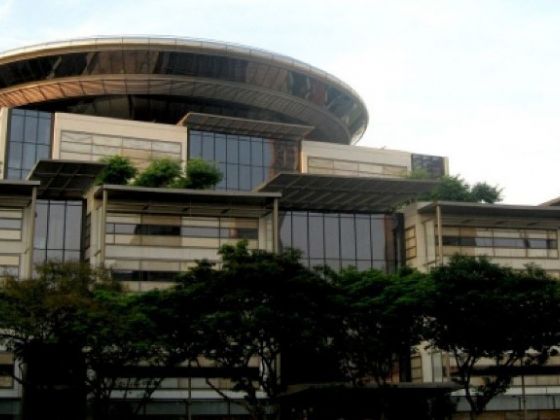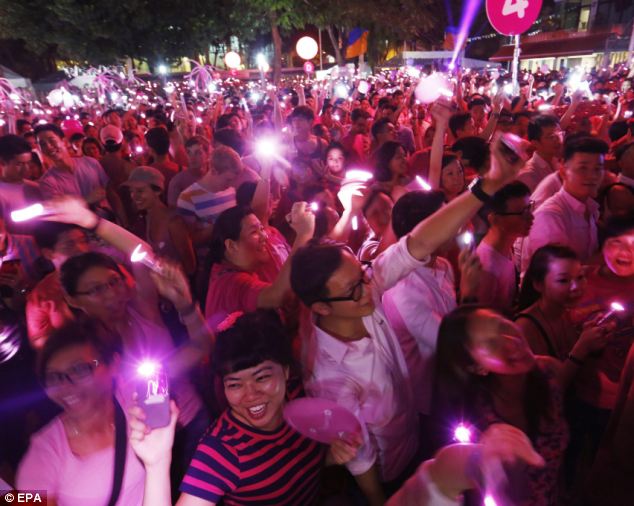Singapore's Highest Court Upholds Ban On Sodomy, Says Section 377A Is Constitutional
Singapore's Court of Appeal has ruled that Section 377A of the Penal Code, which criminalises sex between men, is constitutional.
On 29 October 2014, the Court of Appeal, Singapore's highest court, ruled that the country's 76-year-old sodomy law, known as Section 377A, is constitutional. The archaic law has been on the books since the Southeast Asian nation was a British colony.
The law, known as Section 377A, was retained in 2007 after a two-day debate in parliament where related provisions that made heterosexual oral and anal sex a crime were repealed. Church groups and gay-rights activists have clashed over the ban, which the government says it hasn’t actively enforced since the mid-1990s.
bloomberg.comAs a result, three gay men lost their fight to overturn Singapore's ban on sex between males. In their 107-page decision, the Court of Appeal Justices said the "intensely controversial" challenge is best debated before the city's Parliament, Bloomberg reported.
Gay couple Gary Lim, 46, and Kenneth Chee, 38, as well as 51-year-old Tan Eng Hong, contend that the provision is discriminatory and should be declared void by the court. The couple who challenged the ban, said they are “deeply disappointed” and hope parliament will consider their case. “We hope that Singaporeans will see this as a minor setback for equality and fairness,” Chee and Lim said.
Court of Appeal Justices Andrew Phang, Belinda Ang and Woo Bih Li said in their 107-page decision: “Whilst we understand the deeply held personal feelings of the appellants, there’s nothing that this court can do to assist them. Their remedy lies, if at all, in the legislative sphere. Only one voice -- and one voice alone -- is relevant. It is the voice of the law, which represents the voice of objectivity.”
bloomberg.comWhile Singapore’s multiracial, multicultural, multilingual and multireligious society allows “real and practical freedom for each group,” this can’t be extended by the insistence of a particular group so that certain values can be imposed on others, the judges said.
bloomberg.comThe gay couple's argument is that Section 377A infringes their right to equal protection under the law, as guaranteed by Article 12 of the Constitution, and violates their right to life and liberty, as guaranteed by Article 9, The Straits Times reported
People with LED lights take part in forming a giant pink dot to promote acceptance of the LGBT community in Singapore on June 30, 2012
Image via Tim Chong / ReutersMr Tan Eng Hong and gay couple Mr Gary Lim and Mr Kenneth Chee contended that Section 377A contravened Articles 9 and 12 of the Constitution and so should be struck down. But the Court of Appeal on Wednesday rejected their arguments and ruled that Section 377A was constitutional. Article 9 states that "no person shall be deprived of his life or personal liberty save in accordance with the law".
Senior Counsel Deborah Barker, acting for the couple, argued that the right to life and personal liberty under Article 9 should include a right to privacy and personal autonomy for a person to express love towards another human being. But the court rejected this interpretation, holding that the phrase "life or personal liberty" refers only to a person's freedom from an unlawful deprivation of life and unlawful incarceration.
Mr M Ravi, acting for Mr Tan, argued that Section 377A was so vague, arbitrary and absurd that it did not qualify as "law" under Article 9. The court disagreed that the phrase "act of gross indecency with another man" in Section 377A was vague. Also, the concept of indecency is found in other Singapore laws, such as the Women's Charter and the Children and Young Persons Act.
The court also rejected Mr Ravi's argument that Section 377A was absurd because it criminalised a minority based on a core aspect of their identity which was unchangeable. The court noted that there are still conflicting scientific views on whether sexual orientation is unchangeable so it was premature to express any conclusive views on it. In any case, the supposed unchangeability of sexual orientation is an "extra-legal" issue that is outside the remit of the court.
Article 12 states that "all persons are equal before the law and entitled to the equal protection of the law". It specifically forbids discrimination against Singapore citizens on grounds of religion, race, descent or place of birth. While Article 12 guarantees equal protection, the courts have long held that lawmakers are allowed to pass laws that treat people differently - if it is based on a reasonable classification.
A lawyer for one of the three gay men, said in a statement the decision legitimised discrimination against gay men in Singapore. However, the measure does not target sex between lesbians.
The judgment is a step backwards for human rights in Singapore, said M Ravi, a human rights lawyer who acted for Tan in the case. "It appears that this absurd and discriminatory law criminalizes the core aspect of an individual's identity, in this case, homosexual men," he said in a statement.
The measure does not target sex between lesbians, however. "This unequal treatment in the law is based on hatred for hatred's sake, and discrimination for discrimination's sake, and nothing else," Ravi added.
As per The Strait Times, in Singapore, the courts have used what is known as the reasonable classification test to determine whether a statute that differentiates is consistent with Article 12
Under this test, a statute that differentiates is constitutional if the classification is based on an "intelligible differentia", meaning a distinguishing feature that is discernible, and if the differentia bears a rational relation to the objective of the law. The court held that the classification prescribed by Section 377A - men who perform acts of gross indecency with other men - was based on an intelligible differentia.
After analysing historical documents on the enactment of Section 377A, the court ruled that there was a "complete coincidence" in the relation between that differentia and the purpose and objective of Section 377A, to enforce societal morality. As such, Section 377A passes legal muster under this test.
The court went on to note that Article 12 does not address the issues involved in Section 377A. While the provision specifically prohibits discrimination based on religion, race, descent or place of birth, the words "gender", "sex" and "sexual orientation" are noticeably absent.
Tan Eng Hong, who was caught having oral sex with a man in a public toilet in 2010, was the first to launch the legal bid. Later, gay couple Lim Meng Suang and Kenneth Chee pursued a similar challenge. Watch this video from 2013 about the couple and their legal challenge against Singapore's anti-gay law:
World wide, battles over gay rights have gained prominence in the past couple of years
A federal judge in Puerto Rico last week upheld the commonwealth’s ban on same-sex marriage, after gay marriages were legalized in at least 32 U.S. states.
bloomberg.comIndia in December overturned a 2009 verdict legalizing consensual gay sex. Russia enacted anti-gay laws, stoking international ire, and New Zealand became the first Asia-Pacific nation to legalize gay marriages.
bloomberg.com


